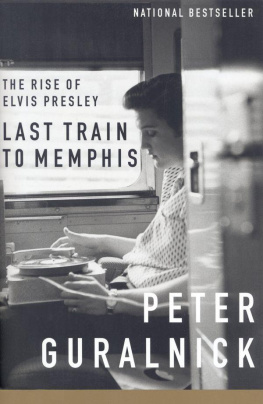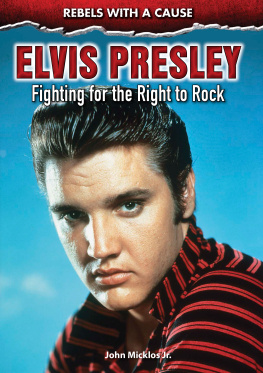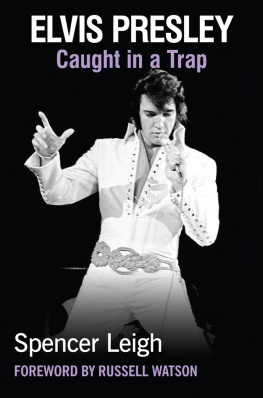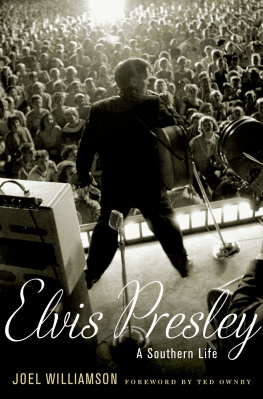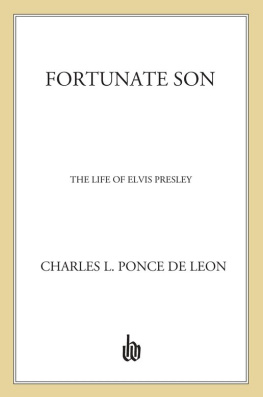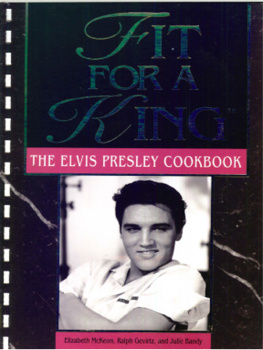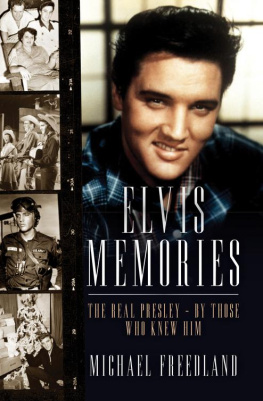Guralnick - Last Train to Memphis: The Rise of Elvis Presley
Here you can read online Guralnick - Last Train to Memphis: The Rise of Elvis Presley full text of the book (entire story) in english for free. Download pdf and epub, get meaning, cover and reviews about this ebook. year: 2012, publisher: Hachette Digital, Inc., genre: Non-fiction. Description of the work, (preface) as well as reviews are available. Best literature library LitArk.com created for fans of good reading and offers a wide selection of genres:
Romance novel
Science fiction
Adventure
Detective
Science
History
Home and family
Prose
Art
Politics
Computer
Non-fiction
Religion
Business
Children
Humor
Choose a favorite category and find really read worthwhile books. Enjoy immersion in the world of imagination, feel the emotions of the characters or learn something new for yourself, make an fascinating discovery.
- Book:Last Train to Memphis: The Rise of Elvis Presley
- Author:
- Publisher:Hachette Digital, Inc.
- Genre:
- Year:2012
- Rating:3 / 5
- Favourites:Add to favourites
- Your mark:
Last Train to Memphis: The Rise of Elvis Presley: summary, description and annotation
We offer to read an annotation, description, summary or preface (depends on what the author of the book "Last Train to Memphis: The Rise of Elvis Presley" wrote himself). If you haven't found the necessary information about the book — write in the comments, we will try to find it.
From the moment that he first shook up the world in the mid 1950s, Elvis Presley has been one of the most vivid and enduring myths of American culture.
Last Train to Memphis: The Rise of Elvis Presley is the first biography to go past that myth and present an Elvis beyond the legend. Based on hundreds of interviews and nearly a decade of research, it traces the evolution not just of the man but of the music and of the culture he left utterly transformed, creating a completely fresh portrait of Elvis and his world.
This volume tracks the first twenty-four years of Elvis life, covering his childhood, the stunning first recordings at Sun Records (Thats All Right, Mystery Train), and the early RCA hits (Heartbreak Hotel, Hound Dog, Dont Be Cruel). These were the years of his improbable self-invention and unprecedented triumphs, when it seemed that everything that Elvis tried succeeded wildly. There was scarcely a cloud in sight through this period until, in 1958, he was drafted into the army and his mother died shortly thereafter. The book closes on that somber and poignant note.
Last Train to Memphis takes us deep inside Elvis life, exploring his lifelong passion for music of every sort (from blues and gospel to Bing Crosby and Mario Lanza), his compelling affection for his family, and his intimate relationships with girlfriends, mentors, band members, professional associates, and friends. It shows us the loneliness, the trustfulness, the voracious appetite for experience, and above all the unshakable, almost mystical faith that Elvis had in himself and his music. Drawing frequently on Elvis own words and on the recollections of those closest to him, the book offers an emotional, complex portrait of young Elvis Presley with a depth and dimension that for the first time allow his extraordinary accomplishments to ring true.
Peter Guralnick has given us a previously unseen world, a rich panoply of people and events that illuminate an achievement, a place, and a time as never revealed before. Written with grace, humor, and affection, Last Train to Memphis has been hailed as the definitive biography of Elvis Presley. It is the first to set aside the myths and focus on Elvis humanity in a way that has yet to be duplicated.
Amazon.com ReviewTheres no mention of sequins, drugs, or peanut butter in this understated biography of the teenaged Elvis, a serious and worthy attempt to answer the question, Who was this guy before he was an icon, the voice of a generation, the King? The essential clarity and honesty of Guralnicks prose clearly limns the eager, malleable boy whose immense talent changed the course of American music.
From Publishers WeeklyGiven the passion evident in most books about Elvis Presley (1935-1977), the scrupulously dispassionate tone of this new biography, the first of a projected two volumes, is admirable and startling. Guralnick (Lost Highway) lets the facts speak for themselves, more or less, by providing solid background and quoting at length from people who knew Elvis as well as the contemporary press. In retelling the familiar story of a poor Southern boys meteoric rise to unprecedented fame, Guralnick eschews the conventional wisdom-Elvis was an instinctive artist whose career was trashed by his manager, Colonel Tom Parker, and by movie and record company executives-to present a more complex picture. He shows those associated with Elvis struggling to get a handle on a new music form, rock n roll, that they barely understood. At times, one wishes the author were more open about his own opinions. But this welcome relief from the hysterical tone of most Elvis books closes somberly with the performers induction into the Army and the death of his beloved mother in 1958. Photos. Author tour.
Copyright 1994 Reed Business Information, Inc.
Guralnick: author's other books
Who wrote Last Train to Memphis: The Rise of Elvis Presley? Find out the surname, the name of the author of the book and a list of all author's works by series.

